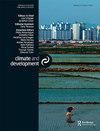Climate shocks, vulnerability, resilience and livelihoods in rural Zambia
IF 3.4
3区 环境科学与生态学
Q1 DEVELOPMENT STUDIES
引用次数: 0
Abstract
Climate and weather shocks pose risks to livelihoods in Southern Africa. We assess the extent to which smallholders are exposed to climate shocks in Zambia and how behavioural choices influence the negative effects of these shocks on vulnerability and resilience. We use household data from the nationally representative Rural Agricultural Livelihoods Survey and employ an instrumental variable probit regression model to control for the endogeneity of key choice variables. There are four main findings. First, droughts are the most prevalent climate shock faced by rural smallholder farmers in Zambia, but the extent of exposure differs spatially, with the Southern and Western Provinces being the hardest hit. Nationally, 76% of all smallholder farmers are vulnerable and only 24% are resilient, with female households most vulnerable. Second, increased climate shocks correlate with both increased vulnerability and reduced resilience, with short- and long-term deviations in seasonal rainfall worsening vulnerability and resilience. Third, higher asset endowments and education are correlated with reduced vulnerability and increased resilience. And last, climate-smart agricultural practices significantly improve household resilience. These findings imply a need to support scaling of climate-smart agricultural technologies and to invest in risk mitigation strategies such as weather-indexed insurance and targeted social cash transfers.赞比亚农村的气候冲击、脆弱性、复原力和生计
气候和天气冲击给南部非洲的生计带来风险。我们评估了赞比亚小农遭受气候冲击的程度,以及行为选择如何影响这些冲击对脆弱性和复原力的负面影响。我们使用来自全国代表性农村农业生计调查的家庭数据,并采用工具变量probit回归模型来控制关键选择变量的内生性。主要有四个发现。首先,干旱是赞比亚农村小农面临的最普遍的气候冲击,但受影响的程度在空间上存在差异,南部和西部省份受影响最严重。在全国范围内,76%的小农处于弱势,只有24%的小农具有抵御能力,其中女性家庭最为脆弱。其次,气候冲击的增加与脆弱性的增加和恢复力的降低相关,季节性降雨的短期和长期偏差使脆弱性和恢复力恶化。第三,较高的资产禀赋和教育水平与脆弱性降低和抵御能力增强相关。最后,气候智能型农业实践显著提高了家庭抵御能力。这些发现意味着需要支持气候智能型农业技术的规模化,并投资于风险缓解战略,如天气指数保险和有针对性的社会现金转移支付。
本文章由计算机程序翻译,如有差异,请以英文原文为准。
求助全文
约1分钟内获得全文
求助全文

 求助内容:
求助内容: 应助结果提醒方式:
应助结果提醒方式:


